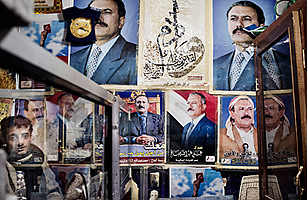
Pictures of President Saleh hang in a shop in the old town of Sana'a
Floundering regimes always blame their plight on enemies, real or imaginary: the more anxious the autocrat, the more fictional the foe. Egypt's Hosni Mubarak fingered the Muslim Brotherhood. Bahrain's King Hamad bin Isa al-Khalifa pointed to Iran. Libya's Muammar Gaddafi alternates between youth on hallucinatory drugs and al-Qaeda. And on March 1, Yemen's President, Ali Abdullah Saleh, his 32-year reign threatened by the popular uprising sweeping across the Middle East, accused ... No, you'd best hear this in his own words. "There is an operations room in Tel Aviv with the aim of destabilizing the Arab world," he said in a speech at Sana'a University. The operations room in question, he added, is "run by the White House."
But a day later, Saleh seemed much less defiant as he accepted a proposal to ease him out of office. A government spokesman told TIME the President had agreed to a five-point plan suggested by opposition parties — although the timeline for his departure remained vague. (Saleh also apologized to U.S. Deputy National Security Adviser John Brennan for insinuating that the White House had played a role in the fall of Arab regimes.)
It's not yet clear whether Saleh's deal with the opposition parties will satisfy antiregime protesters who have been demonstrating across the country for two weeks running, enduring violent attacks by Saleh's thugs and riot police. They were unimpressed by the President's earlier promise not to stand for re-election in 2013: they want him out now. "There is no [deal] that will be acceptable," said Khaled el-Anesi, a human-rights lawyer and leader of the mostly young protesters. "The last word will come from the street." Saleh's political rivals — in recent days, their ranks have been swelled by defections from his party and the decision of major tribal leaders to abandon their longtime patron — now sense weakness and may push him to a swifter exit.
Saleh, 68, may simply have waited too long to make a bargain. He "does not have a lot of options left," says Gregory Johnsen, a Yemen analyst at Princeton University. "The problem is that he believes he can still act and negotiate from a position of strength when in fact the ground has shifted substantially under his feet."
For the Obama Administration, which is struggling with the consequences of the toppling of other Arab dictators, Saleh's predicament is especially worrisome. Impoverished Yemen (pop. 24 million) may be at the fringes of the world economy and Arab politics, but it punches well above its weight in global terrorism, as both a supplier of jihadists to holy wars abroad and a home for al-Qaeda's most ambitious franchise. Al-Qaeda in the Arabian Peninsula (AQAP) was behind many major terrorist plots uncovered in the U.S. over the past two years, including last fall's effort to use the global airfreight network to detonate bombs on board a Chicago-bound plane and the attempt to blow up a passenger jet over Detroit on Christmas Day 2009. The group also shelters the American-born preacher Anwar al-Awlaki, who has been in Yemen since 2004 and has been linked to several of these plots.
Saleh, who long ignored the terrorist threat, has recently been responsive to U.S. pressure to crack down: dozens of Yemeni soldiers have been killed in campaigns against terrorists. He has allowed the CIA to employ drone attacks against AQAP targets in Yemen, taking the blame when the strikes evoked popular outrage — a fact embarrassingly revealed by WikiLeaks in November. The Obama Administration doubled counterterrorism aid to $150 million in 2010, and U.S. special forces are helping train Yemeni troops. Regime change in Sana'a could jeopardize that cooperation and potentially take pressure off AQAP — a point that Saleh's officials have been keen to make since the protesters began to press for his ouster. "If we go, this country will be wide open," one official tells TIME, asking not to be named. "People who want to support these so-called revolutionaries should stop and ask themselves if these kids can protect the world from al-Qaeda."
Our Wars Are Not Your Wars
Dire warnings by a flailing regime should not be taken at face value, but there's good reason to worry that any new government in Sana'a may not take AQAP as seriously as Saleh has belatedly done. Yemen faces two other internal dangers: a Shi'ite rebellion in the north and a separatist movement in the south. Most Yemenis regard those as greater existential threats than any posed by AQAP. "Our priorities," says Ali Soufan, a former FBI counterterrorism official who has spent a great deal of time in Yemen, "are not necessarily their priorities."
That point was made more vividly by a pro-American Yemeni sheik I met in Sana'a last November. "I support al-Qaeda," Abdullah al-Jamili told me. He noted my look of surprise with a nod and a smile of satisfaction. "Go ahead, write it down: I support al-Qaeda. They help me fight my enemies, so I support them." Photographer Yuri Kozyrev and I had heard this line before when, back in 2003, Iraqi tribesmen made common cause with jihadists to fight the U.S. military. Many of those Iraqis would eventually be murdered by al-Qaeda, and as al-Jamili plied us with bottles of nonalcoholic beer, we could visualize the same fate befalling this genial Yemeni.